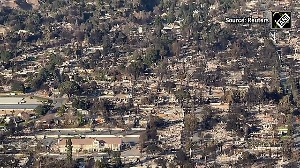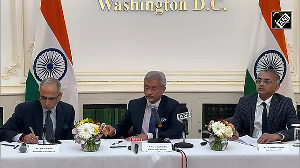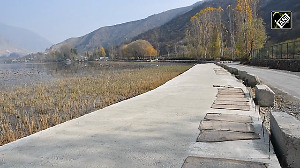It was a day of Maoists, for Maoists and by Maoists as tens of thousands of rebels swarmed the streets of Kathmandu to participate in a mammoth rally on Friday. It was aimed at raising their demand for the early constitution of a new constituent assembly to be followed by a free and fair election to elect a new democratic government.
The Maoists also issued separate warnings to the recently-ousted royalty and the seven-party democratic government installed barely a month ago.
If the enthusiastic participation at the rally could be any indication, then there should be no doubt about the rising graph of the Maoists, who until recently were treated as outlaws or rebels.
In a vociferous attack on the King -- and at a stone's throw from his royal palace -- the Maoists made it clear that they will not allow him to have even a remote or nominal connection with the governance of the country.
The crowds at the rally not only kept the massive Khula-Manch (open forum) ground at Ratna Park jampacked for more than five hours but also spilled over into each of the surrounding roads. Even a foot bridge at Ratna Park junction remained packed with young men and women .
The still simmering anger against King Gyanendra was clearly visible throughout. Each time one of the Maoist leaders made some remark against the royalty in general or the King in particular, the crowds burst into rapturous applause, with thousands of clenched fists going up in the air.
It was one of those very rare days when red flags bearing the Communist symbol of sickle and hammer fluttered from every lamppost. There were also red banners condemning the King and demanding a new constitution and the setting up of a 'true republican democracy'.
For the Maoists, who had been waging a bloody battle against the royalty for a full decade, it was also rather unusual to get their voice heard right up to the gates of the heavily guarded royal palace. Loudspeakers were installed very close to the gates of the palace, barely 500 metres from the venue.
Despite assurance by the organisers, the King's army was visible in their combat kits at all strategic points around the palace. It was another matter that King Gyanendra was away in a neighbouring village participating in an annual religious ritual.
"Significantly, it was the first time that the King had changed his route to go to Machchindranarth yatra because the rally was coming in the way," a local official told rediff.com.
Expressing his displeasure with the working of the Koirala government Krishna Bahadur Mahara, convernor of the peace talks with the government, told the crowds amidst cheers, "Sadly the present government had failed to fulfill the commitments made to us and they were going too slow."
He said, "Sometimes one begins to suspect whether they would eventually fall into the trap that the King was trying to lay so that he could sabotage the democratic process."
While the Maoist movement chief Prachand was conspicuous by his absence, his supporters assured the crowds that he would make a public appearance later. "Prachand is currently engaged in chalking out plans for the development of Nepal and the upliftment of its people," Mahara told the crowds.
Citing an example of the government's alleged ineffectiveness, Nepal Communist Party (Maoist) deputy commander Janardhan Sharma 'Prabhakar' said in his speech, "So far, the government had only changed the name of the Royal Nepal Army to Nepal Army, but the control of the military continues to vest with the King and his men, which must be ended without further delay."
He said, "What we need today was not the Raja's army but a people's army that could be raised with the active participation of our People's Liberation Army together with the soldiers of the Nepal Army."
Prabhakar as well as other speakers stressed on 'strict and deterrent action against the corrupt in governance'.
The youth, which forms the bulk of the Nepali population, not only looked enthusiastic about the Friday rally, but were also quite vocal in expressing their views against the royalty. "The king has looted the common Nepali for too long; he needs to go, especially after what he did to his brother's family," remarked Narendra Bahadur Thapa, a young university student .
He was referring to the massacre of the then King Birendra and his family in the palace exactly five years ago on June 1, 2001. The average Nepali openly accuses Gyanendra of masterminding the killings.
"We are so excited today," said Santosh Shreshtha, a second-year engineering student. "I am confident that once the King is thrown completely out of power, Nepal will witness a new era of development, prosperity and peace," he added.
He does feel sorry for the 13,000 odd people who have died in the 10-year long Maoist violence, but feels, 'what is done cannot be undone, but I am sure Maoists are here to ensure the well being of the common Nepali as also emphasising on restoration of true democracy'.
B Ed student Narayan Bhatt did not mince words in commenting on the King - "Remember, King Gyanedra is still not out; and until he is there on the scene, he is capable of playing mischief and getting back on to the power pedestal to trample the common Nepali."
It was therefore no surprise that the Maoists' warnings to both the King and the seven-party ruling alliance were received with equal applause by the mammoth audience - described as 'unprecedented' by locals.
Complete coverage:






 © 2025
© 2025